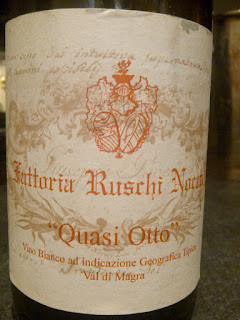 |
| Apologies for the usual Slotovino focus. We hope you can just make out the name Luadga in line two. |
Imagine you are an intrepid African explorer and have mounted 2 or 3 expeditions to find an elusive animal last heard of many years ago. there lurks a suspicion that this species may be extinct and indeed you return empty handed. Your worst fears seem to have been realized but one day walking by a pet shop you see the very animal in the window.
When you have finished hyperventilating you go in and buy the creature thus securing it for your collection and the greater knowledge of mankind.
Something like this has just happened to Slotovino. Remember our investigation of the 'Lost corner of Tuscany'? We said then that the wines from the area Colli di Candia, Alpi Apuani, Val di Magra etc. were little known even in the area and in some cases we had the feeling that producers were not interested in selling their wines. The producer we had in mind was one whose wines we couldn't find no matter how hard we tried: Fattoria Ruschi Noceti (Val di Magra, Liguria). They did not take telephone calls or answer emails. Their wines were nowhere to be found. We assumed they may have become extinct.
Then we discovered not one but three of their wines on the shelves of Bottle Apostle, now opened in Regent's Park Road, Primrose Hill, London. We nearly did hyperventilate.
We bought the red made from Pollera grapes - such a great discovery at our tasting and a white made from Durella and something called Luadga. Durella we had heard of but Luadga? There is no mention of it in 'Wine Grapes', 'Native wine grapes of Italy' or the 'Dictionnaire encyclopedique des cepages'.
 |
| not dead, not a goat but you get the picture (one we had conveniently archived for just such an occasion). |
There was even one entry on Google which speculated that Luagda is an acrostic for Looking Up A Dead Goat's Arse.
Don't be put off. The wine is really attractive. It is an orange wine in fact and tastes delicious. How much of its success is down to Luagda and how much to the Durello it is hard to say.



No comments:
Post a Comment